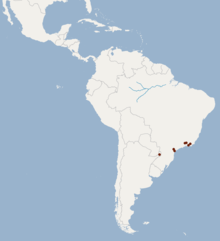Myotis izecksohni
Myotis izecksohni is a species of mouse-eared bat that is endemic to Brazil[1] and Argentina.[2]
| Myotis izecksohni | |
|---|---|
| Scientific classification | |
| Kingdom: | Animalia |
| Phylum: | Chordata |
| Class: | Mammalia |
| Order: | Chiroptera |
| Family: | Vespertilionidae |
| Genus: | Myotis |
| Species: | M. izecksohni |
| Binomial name | |
| Myotis izecksohni Moratelli, Peracchi, Dias & de Oliveira, 2011 | |
 | |
Taxonomy
M. izecksohni was described as a new species in 2011. The holotype had been collected in 2005 in Tinguá Biological Reserve. The eponym for the species name "izecksohni" is Brazilian biologist Eugênio Izecksohn.[3]
Description
It is a medium- to large-bodied mouse-eared bat among those found in South America. It has a forearm length ranging from 33.1–38.3 mm (1.30–1.51 in). Its fur is long with a silky texture; the fur of its back is bicolored, with the basal two-thirds of individual hairs dark, while the distal third is dark-brown to medium-brown. The fur of its belly is also bicolored, though overall lighter brown than the back fur. It lacks hairs along the outer edge of the uropatagium, which is a useful field identification characteristic.[3]
Range and habitat
M. izecksohni was first documented in southeastern Brazil and has since been discovered in far northeastern Argentina.[2] It has been found at a range of elevations from 760–1,000 m (2,490–3,280 ft) above sea level.[1]
References
- Solari, S. (2017). "Myotis izecksohni". IUCN Red List of Threatened Species. 2017: e.T88151563A88151572. doi:10.2305/IUCN.UK.2017-2.RLTS.T88151563A88151572.en.
- Barquez, R.M.; M.D. Miotti; F.M. Idoeta; M.M. Díaz (2017). "Two new species of Myotis (Chiroptera: Vespertilionidae) for Argentina". Pap. Avulsos Zool. 57 (22). doi:10.11606/0031-1049.2017.57.22.
- Moratelli, Ricardo; Peracchi, Adriano L.; Dias, Daniela; De Oliveira, João A. (2011). "Geographic variation in South American populations of Myotis nigricans (Schinz, 1821) (Chiroptera, Vespertilionidae), with the description of two new species". Mammalian Biology. 76 (5): 592–607. doi:10.1016/j.mambio.2011.01.003.
